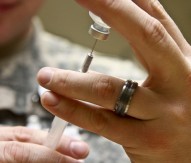
Human and fruit flies share common reaction to high-fat diet
A fat-heavy diet triggers an immune response that may lead to diabetes and other health problems, according to a study of fruit flies by the researchers at King’s College London.
Part-funded by the European Research Council, scientists investigated the relationship between a chronic high-fat diet, the immune system, and insulin resistance and lifespan. Using drosophila, or fruit flies, as a model to explore the molecular pathways involved in the immune response to excess dietary fats and metabolic stress, the experts identified the role of macrophages (immune cells that scavenge fat) in blood sugar regulation, fat storage and lifespan.
After chronic feeding with a high-fat diet, flies exhibited strikingly similar effects to humans; they accumulated excess fat, their blood sugar levels rose, they became insulin-resistant and their lifespan dropped. In addition, fly immune blood cells, known as plasmatocytes, became filled with fat droplets whilst also triggering the production of a pro-inflammatory cytokine molecule known as unpaired3. Unpaired3 has a counterpart in mammals called Interleukin-6, which has previously been associated with diseases induced by high-fat diets.
Commenting, Dr Katie Woodcock, the first author of the study said: “We have discovered the mechanism which may be responsible for the detrimental effects of excess dietary fat. This immune pathway may offer potential future therapeutic targets for the treatment of diet-related diseases such Type 2 diabetes. However, further work is needed to establish whether similar pathways might operate in mammals, and whether these would be useful targets for health interventions.”
The research team demonstrated that unpaired3, produced by macrophages, is responsible for insulin resistance high blood sugar, and reduced lifespan, whilst fat storage in itself did not affect longevity and blood sugar levels. They also defined the signalling pathway responsible for unpaired3 production by macrophages. The scientists discovered that blocking any step of the pathway that led to cytokine production was sufficient to prevent the elevated sugar levels and insulin resistance observed in the flies and boosted their lifespan, even though fat continued to accumulate in the flies’ tissues.
Results of the study in full are published in the journal Immunity.






